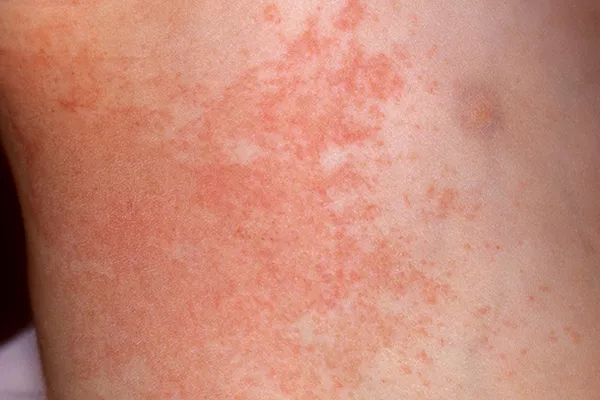Hives, also known as urticaria, are a common skin condition characterized by raised, red, and itchy welts or bumps on the skin. For individuals experiencing hives, the sensation of heat in these affected areas can be quite perplexing and uncomfortable. The warmth associated with hives is often a key symptom that can provide insights into the underlying causes of this skin reaction. In this article, we will delve into the various reasons why hives can feel hot, the physiological processes at play, and practical steps for managing and preventing this sensation.
What Are Hives and Their Typical Symptoms?
Before addressing why hives can feel hot, it’s important to understand the basics of this skin condition. Hives manifest as raised, often itchy welts on the skin that can vary in size and shape. These welts are typically red or skin-colored and may appear suddenly and disappear within hours or days. Common symptoms of hives include:
- Raised, Red Bumps: The hallmark symptom of hives is the appearance of raised bumps on the skin.
- Itching: Hives are often accompanied by intense itching, which can worsen the sensation of heat.
- Swelling: In some cases, hives can cause swelling, particularly around the lips, eyes, hands, and feet.
- Warmth: Many individuals with hives report a sensation of warmth or heat emanating from the affected areas.
The warmth associated with hives is a result of the underlying inflammatory processes triggered by various factors, which we will explore next.
Why Do Hives Feel Hot?
Several factors contribute to the sensation of heat in hives:
1. Inflammatory Response: Hives are primarily an inflammatory reaction of the skin triggered by the release of histamine and other chemicals from immune cells known as mast cells. This inflammatory response increases blood flow to the affected area, causing warmth and redness.
2. Vasodilation: Histamine, a key player in allergic reactions, causes blood vessels in the skin to dilate (widen). This vasodilation allows more blood to flow to the affected area, leading to increased heat and redness.
3. Itching: The intense itching associated with hives can further exacerbate the sensation of warmth. Scratching or rubbing the affected areas can stimulate nerve endings and increase blood flow, intensifying the heat sensation.
4. Underlying Causes: The underlying triggers of hives can also contribute to the sensation of heat. For example, hives caused by infections or autoimmune disorders may be accompanied by fever or elevated body temperature, which can contribute to overall warmth.
5. Physical and Emotional Stress: Stress is a known trigger for hives in many individuals. Stress hormones can stimulate the release of histamine and exacerbate inflammatory responses, leading to increased warmth in hives.
Understanding these mechanisms is crucial for effectively managing and treating hives, including addressing the sensation of heat associated with this condition.
Managing the Heat and Discomfort of Hives
If you are experiencing hives with a sensation of heat, there are several strategies you can employ to manage the discomfort:
1. Avoid Triggers: Identify and avoid triggers that exacerbate your hives. Common triggers include certain foods (e.g., nuts, shellfish), medications (e.g., antibiotics, NSAIDs), insect stings, pollen, and emotional stress.
2. Take Antihistamines: Over-the-counter or prescription antihistamines can help block the effects of histamine and reduce inflammation and itching associated with hives. Non-sedating antihistamines are preferred during the day to avoid drowsiness.
3. Use Cold Compresses: Applying cold compresses or ice packs to the affected areas can help reduce itching and inflammation, thereby alleviating the sensation of heat.
4. Topical Treatments: Calamine lotion or creams containing menthol or pramoxine can provide temporary relief from itching and heat associated with hives.
5. Avoid Scratching: Although it may be tempting, avoid scratching or rubbing the hives as this can worsen inflammation and heat.
6. Manage Stress: Incorporate stress-reduction techniques such as meditation, yoga, or deep breathing exercises into your daily routine to help prevent stress-related hives.
When to Seek Medical Attention
While most cases of hives can be managed with over-the-counter treatments and lifestyle modifications, certain situations warrant medical attention:
1. Difficulty Breathing: Hives accompanied by difficulty breathing, wheezing, or swelling of the face, lips, or tongue may indicate a severe allergic reaction (anaphylaxis) requiring immediate medical attention.
2. Persistent Hives: If hives persist for more than a few days despite treatment, consult a healthcare professional to investigate underlying causes such as infections or autoimmune disorders.
3. Associated Symptoms: Fever, joint pain, or other systemic symptoms accompanying hives may indicate an underlying medical condition requiring evaluation and treatment.
Conclusion
The sensation of heat in hives is a common symptom caused by inflammatory responses and increased blood flow to the affected skin areas. Understanding the underlying mechanisms of hives can empower individuals to effectively manage and prevent this discomfort. By identifying triggers, using appropriate medications, and adopting lifestyle modifications, individuals can minimize the impact of hives on their daily lives. If hives persist or are accompanied by severe symptoms, seeking prompt medical attention is recommended to ensure proper diagnosis and treatment. With proactive management, individuals can mitigate the heat and discomfort associated with hives and achieve better skin health and overall well-being.
Related Topics:
Zyrtec vs. Benadryl: Which is Better for Hives?
























